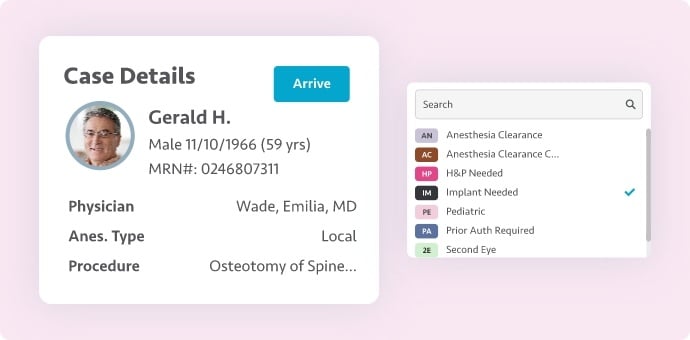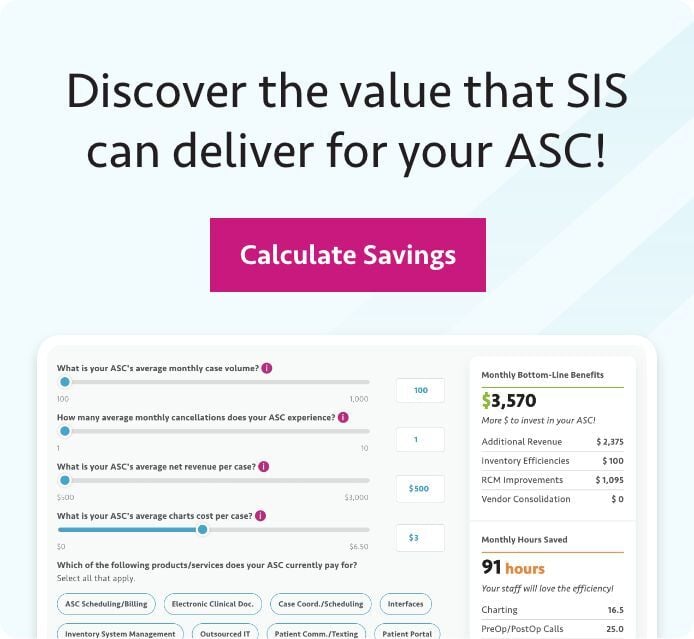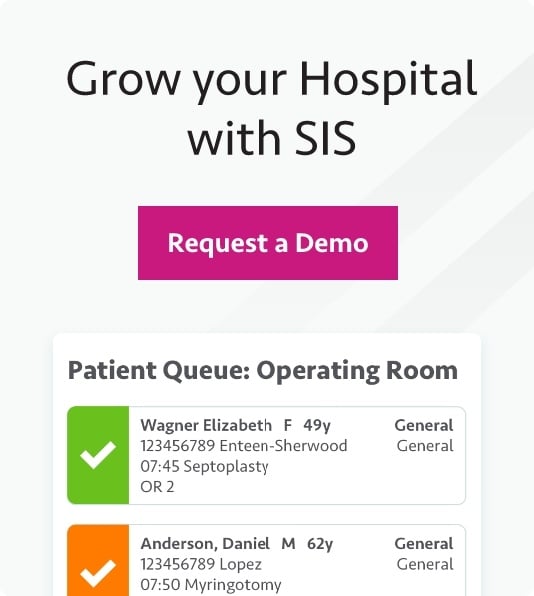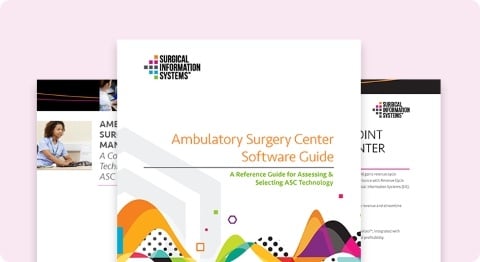Consider these 8 tips to help make your ASC management responsibilities easier to manage. For a deeper dive into optimizing your ASC's operations with technology, explore our comprehensive guide on ASC Management: A Comprehensive Technology Guide for ASC Administrators.
ASC management is no easy task. Besides overseeing the operations of a facility expected to provide exceptional surgical care that delivers optimal outcomes, management must work to meet the needs of its physicians while overseeing a diverse staff fulfilling a wide range of positions and responsibilities. There's also the need to ensure the ASC maintains viability and profitability.
ASC Management Best Practices to Follow
Here are eight tips that can help make challenging ASC management work a little easier and more productive.
1. Identify your physician champion
An effective ASC manager can accomplish a great deal without needing much assistance, but it often helps to have additional leadership support. This is particularly true when issues arise that require the involvement of physicians and/or the governing board.
Enter the "physician champion." This is the physician an ASC manager can rely upon for a number of purposes. The champion can help overcome communication issues and other obstacles that may exist or develop between a manager and physicians/board members. The champion can be called upon by a manager to support initiatives in the best interest of the ASC that may still face internal resistance. The champion can be relied upon to provide insight and guidance on ASC management issues, when requested by the manager.
In addition to working well with the manager, a strong physician champion will be respected by peers and staff, serve as an effective communicator, and have a strong grasp of ASC clinical and financial operations. It is also particularly beneficial for the champion to serve on the board so this individual will be present at board meetings and more likely to hold the respect of board members.
2. Set governing board meetings for one hour — and stick to it
Governing board meetings are pivotal to successful ASC management for a number of reasons. They represent a designated time to tackle regulatory issues required for compliance. They provide an opportunity to discuss problems, solutions, and improvement opportunities. They also serve as a forum for short- and long-term planning.
Governing board meetings must accomplish all these objectives and do so while keeping board members engaged enough to participate and contribute. That's why it's important to determine an appropriate length for board meetings and never start late or run long.
An hour tends to be enough time to work through a full, well-planned agenda. It's also a reasonable amount of time to request participation from board members on a periodic (e.g., quarterly) basis. If you plan to start your board meeting at 6:00 p.m., make sure it begins at 6:00 p.m. If you plan to end at 7:00 p.m., be prepared to end then, moving through agenda items in a timely fashion to cover everything you need to.
If you stick with this clearly defined approach to board meetings, board members will know they are expected to be active participants for that entire hour. Start a little late and you may find yourself rushed to cover everything on the agenda. In addition, board members might begin showing up a little late for future meetings if they do not believe your stated start time is actually the start time.
Try to keep board members past your designated end time because you started late or planned the agenda poorly and you may see some board members leave the meeting at the end time or start looking at the clock impatiently, thus losing their full engagement. Poorly run board meetings also do not reflect positively on a manager's ASC management skills.
3. Bring the governing board problems and solutions
ASC governing boards generally expect their managers to take care of day-to-day facility issues that require small, simple fixes. That expectation can extend to some larger issues in areas including human resources and purchasing (besides capital investments).
But sometimes there are more significant problems and matters that require governing board involvement and decision making. When an issue arises, ASC managers should put together an easy-to-digest summary of the issue — supported by graphics like charts, when applicable — to help board members quickly get up to speed on the problem and its cause(s).
The manager should not just come to the board with the problem. The manager should research and determine possible solutions for board members to consider. Managers should note which solution they recommend and secure support for that advice from the physician champion. This preparation will help move board discussions forward, preferably to the solution that the manager, who will have spent ample time researching the issue and evaluating solutions, recommends.
4. Take advantage of social media for staff recruitment
With increased competition for staff (fueled, in part, by health workforce shortages), many ASC managers are finding it more difficult to recruit qualified professionals when job openings arise. Social media can be an effective tool — and one that is often overlooked — for a manager seeking to add staff.
Some platforms offer the ability to post job openings either for free (usually with a paid option to extend the posts reach) or a fee. Some platforms offer the ability to join groups of professionals who have worked or currently work in the positions you are looking to fill. These groups may have a process through which you can share job openings. Another advantage of social media is the ability for users to share (sometimes via "tagging" another user) an opening with others, helping extend the opening's reach.
When you are looking to fill an opening, ask current staff members in that same position or department which social media platforms they use and if they would recommend any of these platforms for job recruitment. You may also want to inform staff when you use social media to announce a job opening and encourage staff to share the information with anyone they believe may have interest in applying.
5. Lean on staff — including anesthesia providers — for recruitment recommendations
Another way to support your search for new staff and physicians is to call upon existing staff and physicians for recommendations. They may know of other professionals, such as those from previous positions/facilities or industry meetings, who are looking for work or a new facility to perform surgical procedures.
One potential source of good information ASC managers will not want to overlook are their anesthesia providers. Anesthesia groups often provide services to multiple facilities, and anesthesia providers can develop close relationships with staff and physicians. This puts these providers in a position to gain insight into individuals considering — or willing to consider — making a career change that may be strong fits for your openings.
6. Guide and educate staff, but don't always hold their hands
When an ASC manager needs staff to tackle a task, consider taking the following approach:
- explain the task;
- tell staff what they are expected to do;
- explain the timeframe for when you need the task completed;
- tell staff you will provide them whatever is required to complete the task;
- confirm staff understand what is expected of them;
- answer any questions about the task
- tell staff not to hesitate to come back to you for clarification or if they experience problems; and then
- get out of their way.
With so many responsibilities, ASC managers cannot afford to micro-manage projects. Managers must have confidence in their staff to accomplish what is asked of them, as long as what is requested is reasonable (when considering the roles staff were hired to fill and the skills sets required for these positions) and as long as managers are willing and able to provide staff with resources the task requires.
When staff are provided with the freedom to work and not have a manager looking over their shoulder every step of the way, they are more likely to take pride and ownership in their work and performance.
7. Set expectations high
As we said in the beginning, it's not easy to manage a successful ASC. Increasing requirements, tightening reimbursement, higher costs, and greater competition for everything from staff to managed care contracts are just a few of the challenges ASC managers face every day.
With these challenges comes a need for ASCs to perform at a level that best ensures the delivery of great outcomes at a low enough cost to keep the business solvent. This level, suffice it to say, must be high. As such, managers should set comparably high expectations for staff.
Managers should inform staff about what is required for a successful ASC and the specific roles staff play in helping ensure such success. Once these expectations are laid out clearly, managers must hold staff accountable to them. Part of this accountability requires managers to fulfill their ASC management responsibilities and help staff meet expectations and achieve their professional potential in the process.
8. Ensure you have the right ASC management technology
There may be no easier or more effective way to achieve across-the-board improvements in ASC management than investing in technology. The right ASC technology — designed with features and functions specific for surgery centers — can provide managers, staff, physicians, and anesthesia providers with powerful tools that support more timely, appropriate (i.e., evidence-based) decisions and faster, streamlined completion of essential tasks.
ASC industry-leading technology, like SIS Complete, can transform the way an ASC performs scheduling and documentation; accomplishes critical revenue cycle, human resources, and inventory tasks; and achieves team coordination and communication. With access to an ASC analytics solution, a manager can drill down into a surgery center's performance in these and many other areas to identify areas for improvement and gain a stronger understanding of the trends and developments driving operations.
With the right ASC technology, a manager can better ensure staff are consistently performing at their highest level. When staff are successful in their work, there is a wonderful trickledown effect: physicians tend to be happier, and, most importantly, patients typically receive better care. And this is the ultimate measurement — and representative — of a manager's success.
Download a summary of these tips so you can refer back to them as you run your center. Good luck!



























